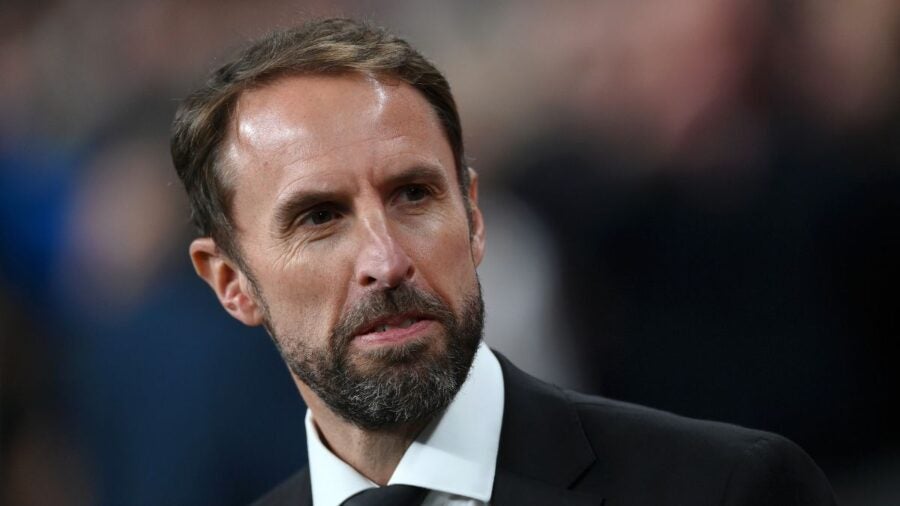
During the England national team’s run to the Euro 2020 final, the leadership of manager Gareth Southgate was recognised as a key element of their success. One of the enduring images of the tournament came as Southgate consoled a distraught 19-year-old Bukayo Saka, whose penalty miss consigned England to defeat at Wembley Stadium – mirroring Southgate’s own missed spot kick at Euro 96.
With the Qatar World Cup nearly upon us, the England manager will be looking to these moments to build his squad’s resilience and hopefully go one step further than at the previous tournament.
“Building resilience requires recognising the moments where things go wrong and how we react in those moments,” Southgate says, while speaking at a digital briefing with Wired Consulting, as part of Google Cloud’s partnership with the FA. “As footballers we’re going to lose matches, we’re going to concede goals, but how we respond in those moments and how we react to these moments will determine how far we can go as a team.”
For those hoping to apply Southgate’s leadership techniques to their own management style, he claims that this ability to learn from setbacks and provide honest appraisals is crucial. “It’s really important to debrief events and performances properly,” he says. “At times you’ve got to be critical, but it must be in an environment that’s open and where people feel they’re not being attacked.”
Developing personal resilience
As the manager of the England national team, the decisions made by Southgate are regularly questioned and scrutinised – both by members of the press and fans. Having confidence in your own abilities is important, especially when others may not recognise the value you’re bringing.
“When I was a young manager, I had many of the same challenges I have now but what I didn’t have was the evidence of results that worked. So I was questioning myself as much as other people were questioning me,” Southgate recalls. “Now, other people might still question me, but I know over a period of time what has achieved results. And that a lot of the things I was doing 10 or 15 years ago were actually right.”
The key to keeping a team motivated is to constantly remind them of the overarching vision
Although the power of hindsight is particularly useful, he hopes it can encourage other leaders who may be questioning their own decision-making. “You’re probably doing a lot more things right than you might think, or than other people might be feeding back to you,” Southgate adds.
In any high-pressure role, it’s common for people to feel doubt or uncertainty but Southgate advises leaders to demonstrate vulnerability in these instances and be a role model of how to talk with others when things go wrong.

“Of course there’s a balance. If you get everything wrong then you lose credibility as a leader, but it can open people up and make them feel a bit safer to speak out,” he adds. “Then you start to create an environment where there’s more psychological safety, which creates a better environment for people to be the best versions of themselves.”
Taking care of mental health is also important for the England team leader, who often thinks of it in terms of “mental fitness”. “Looking after yourself is a fundamental part of mental wellbeing,” he says.
For Southgate, this involves many of the same principles that players follow in their recovery plans. “Whenever we talk about recovery from performance, we talk about the basics of food, exercise, sleep. As a leader we need to go through the same process,” he adds.
Gareth Southgate’s view on hybrid working
For a manager who is more used to working with his team in-person on a training field, the concept of a hybrid-working environment is one that presents several challenges.
“The essence of being a team requires people to get together as often as they can,” Southgate says. “The key to keeping a team motivated is to constantly remind them of the overarching vision. What are we coming together to achieve? When that’s remotely done, it’s more challenging in terms of the personal interactions and getting a feel for where people are.”
This means that leaders should be prepared to spend more time travelling to see team members, wherever they are based and communicating more regularly, particularly at moments when individuals may be having a difficult time.
“When things are going well, there’s often hundreds of messages and pats on the back, but it’s the times when things aren’t going so well that you find out more about people,” Southgate says. “As a leader, they are the key moments to step in and have some of those interactions. Regular communication is critical and, if you’re apart because of distance, you have to make a conscious effort to get together.”

During the England national team’s run to the Euro 2020 final, the leadership of manager Gareth Southgate was recognised as a key element of their success. One of the enduring images of the tournament came as Southgate consoled a distraught 19-year-old Bukayo Saka, whose penalty miss consigned England to defeat at Wembley Stadium – mirroring Southgate’s own missed spot kick at Euro 96.
With the Qatar World Cup nearly upon us, the England manager will be looking to these moments to build his squad’s resilience and hopefully go one step further than at the previous tournament.
“Building resilience requires recognising the moments where things go wrong and how we react in those moments,” Southgate says, while speaking at a digital briefing with Wired Consulting, as part of Google Cloud’s partnership with the FA. “As footballers we're going to lose matches, we're going to concede goals, but how we respond in those moments and how we react to these moments will determine how far we can go as a team.”
